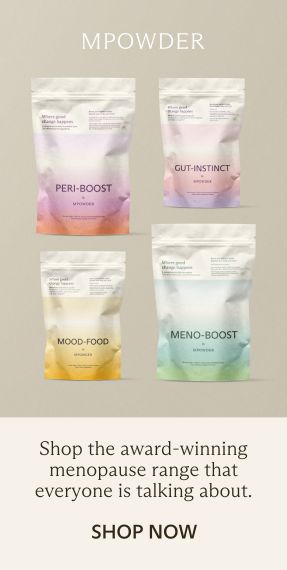Over 40% of women experience joint and muscle pain during the menopause transition. Whether it’s an ache that travels with you through the day or stiffness that makes mornings harder, the discomfort can sap us of energy. But, as with so many of the symptoms we experience, a whole body and mind approach to health can make a big difference to menopause and joint pain.
We deserve to feel well. With any significant change in the way your body behaves, you should always talk to your medical practitioner. Then, get curious. Explore the lifestyle interventions that may help. From what you put on your plate, to how you move: explore the lifestyle interventions that may help. And, if you can’t get all you need from food, consider smart, high quality supplements too.
This guide explores the best supplements for menopause joint pain, grounded in science and shares where you can find them in our carefully sourced, evidence-based blends.
Why menopause can cause joint and muscle pain
The decline in oestrogen during perimenopause and menopause can reduce the body’s ability to regulate inflammation. It also affects collagen production, bone density, and how we metabolise key minerals like calcium and magnesium.
The result? Aches, stiffness, reduced flexibility — particularly in weight-bearing joints like the knees, hips, and lower back. But by supporting your body with targeted nutrients, you can actively reduce these symptoms.
The most effective supplements for menopause joint pain
Below are the nutrients with the strongest evidence for joint and muscle support — many of which are core components in our blends.
Magnesium (as magnesium malate)
- Reduces muscle cramps and supports relaxation
- Important for nerve transmission and bone function
- Found in: PERI-BOOST and MENO-BOOST
Calcium (as calcium citrate)
– Maintains bone density and prevents joint stress
– Calcium citrate is highly bioavailable and well tolerated
– Found in: PERI-BOOST and MENO-BOOST
Vitamin D3
– Enhances calcium absorption and supports immune modulation
– May reduce musculoskeletal pain in women with low levels
– Found in its vegan form in: PERI-BOOST and MENO-BOOST
Zinc (as zinc picolinate)
– Supports tissue repair, collagen formation and anti-inflammatory response
– Found in: PERI-BOOST and MENO-BOOST and MOOD-FOOD
Turmeric
– A well-studied anti-inflammatory compound that may ease joint stiffness and pain
– Particularly beneficial for women with arthritis-related symptoms
– Found in high potency form (curcumin 95%): MOOD-FOOD
Additional support: nutrients that work in synergy
– Vitamin C: Supports collagen production and immune function
– Iron: Helps with oxygen transport to muscles and tissues
– B-complex vitamins (B1, B2, B6, B12): Combat fatigue and support nerve health
– Selenium and copper: Contribute to connective tissue maintenance
– Ahiflower® oil (in MENO-BOOST): A plant-based anti-inflammatory fatty acid source that may help with mobility and stiffness
Which blend is right for you?
Find out more about our blends, and how they may support menopause and joint pain HERE - or dig into each formulation in detail below:
PERI-BOOST: LEARN MORE
MENO-BOOST: LEARN MORE
MOOD-FOOD: LEARN MORE
Curious to explore more:
Read more about aching limbs and the tools to support you
Final thoughts:
Pain is a signal — not a destiny. With the right support, you can stay agile, energised, and active through every stage of menopause. And midlife? An opportunity to move forward rather than stand still. We’re here to help you stay informed, supported and thriving.
References
1. National Institute on Aging (2020):
https://www.nia.nih.gov/health/what-menopause
2. Plotnikoff & Quigley (2003), Mayo Clinic Proceedings: https://pubmed.ncbi.nlm.nih.gov/14557292
3. Daily et al. (2016), Journal of Medicinal Food: https://doi.org/10.1089/jmf.2016.3705
Share Twitter Facebook Pinterest

